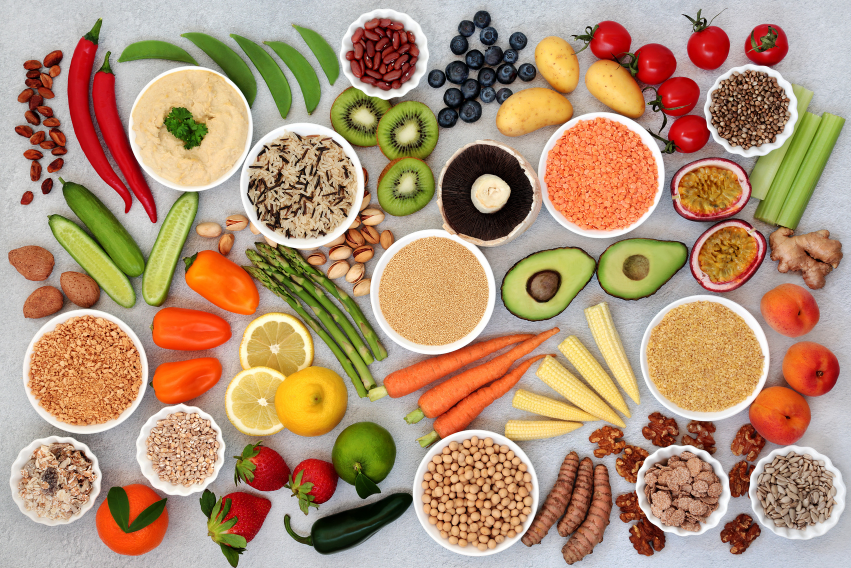
How to Be a Healthy Vegetarian or Vegan
How can you be a healthy vegetarian or vegan? Here’s what we’ve found.
A vegan diet does not use animal products or bi-products, resulting in a diet of plant-based foods. Consuming large amounts and variety of vegetables does contribute to one’s health. A well balanced diet can help decrease risk of chronic disease and promote healthy antioxidants in the body. For instance, plant foods high in fiber such as whole grains, beans, legumes, vegetables, and nuts can help reduce risk of diabetes, colon cancer, and heart disease. Fruits and vegetables, a staple in the vegetarian diet, are high in concentrated amounts of vitamin C, vitamin E, and carotenoids. These act as antioxidants, which protect your body from damaging free radicals. However, there are certain dietary requirements a vegan must meet on a daily basis to consume the necessary amounts of vitamins and minerals.
What Do I Need in my Daily Diet?
As a vegetarian, you may often wonder what daily nutrients you need to obtain and maintain health. Below are guidelines for an average adult’s body. Take into consideration your body type and individual needs–which vary from person to person. A consultation will help determine this for you.
Daily Recommended Nutrients
| Vitamins | Performance Daily Intake | Foods |
| Vitamin A | 5,000-25,000IU/day | Betacarotene foods: green leafy veggies, spinach, broccoli, squash, apricots, cantaloupe |
| Vitamin D | 1,000 IU/day | Fortified with D-orange juice |
| Vitamin E | 200-1,000 IU/Day | Soy, corn, peanut, safflower oils, wheat germ, nuts |
| Vitamin K | 80-190 mcg/day | Green leafy veggies, cereal, dark colored fruits and veggies |
| Vitamin B1-Thiamine | 30-300 mg/day | Wheat germ, whole grains, peanuts |
| B2-Riboflavin | 30-300 mg/day | Brewer’s yeast, nuts, fortified grain products, wheat germ, green veggies, broccoli, asparagus, spinach and turnip greens |
| B3-Niacin | 20-100 mg/day | Brewer’s yeast, whole grains, nuts, legumes, potatoes |
| B5-Pantothenic Acid | 25-200 mg/day | Potatoes, whole wheat, whole grain cereal, fruits & veggies |
| B6-Pyridoxine | 20-100 mg/day | Rice, soybeans, bananas, lima beans, peanuts and walnuts |
| B12-Cobalamin | 12-200 mcg/day | Tofu |
| Biotin | 125-300 mcg/day | Soy flour, cereal, brewer’s yeast, nuts, cauliflower and legumes |
| Folate | 400-1,200 mcg/day | Asparagus, whole wheat, deep green leafy veggies, brewer’s yeast. |
| Vitamin C | 800-3,000mg/day | F & V especially citrus fruits, green and red pepper, collard greens, broccoli, spinach, tomatoes, potatoes and strawberries. |
| Minerals | Performance Daily Intake | Foods |
| Calcium | 1,200-2,600 mg/day | Broccoli, kale, collard greens, tortillas, calcium fortified foods. |
| Magnesium | 400-800 mg/day | Green veggies, whole grains, nuts, legumes, oatmeal and fruit. |
| Phosphorus | 800-1,600 mg/day | Asparagus, bran, brewer’s yeast, corn, legumes, nuts, sunflower and pumpkin seeds. |
| Boron | 6-12 mg/day | Leafy vegetables, fruit, nuts, grains |
| Chromium | 200-600 mcg/day | Mushrooms, bread, brewer’s yeast, black pepper, beer, brown rice, potatoes. |
| Cooper | 3-6 mg/day | Nuts, seafood, cocoa, chocolate, meat, mushrooms |
| Iron | 25-60 mg/day | Molasses, nuts, chocolate, legumes, bread. |
| Manganese | 15-45 mg/day | Brussel sprouts, spinach, peas, turnip greens, wheat germ, beets, bananas, corn, lettuce, barley seeds, whole grain foods (oatmeal, buckwheat). |
| Molybdenum | 100-300 mcg/day | Beans, bread, cereal. |
| Selenium | 100-300 mcg/day | Brazil nuts, whole grains-whole wheat, oats, millet. |
| Zinc | 15-60 mg/day | Whole grain products, oatmeal, maple syrup. |
| Potassium | 2,500-4,000 mg | F & V |
Achieving Protein in a Vegan Diet
Because the vegan diet lacks animal sourced protein, which contain complete sets of amino acids—or are complete proteins, a vegan must be vigilant and make the effort to consume enough protein from other food combinations. Certain foods, when paired together, create a perfect, or complete protein, which includes all of the appropriate essential amino acids.
Complete Protein Combinations
Black beans and rice
Whole grains and peas
Whole grains and peanut butter
Homemade bean soup with whole grains
Nuts and seeds plus legumes
Roasted nuts, seeds and peanuts
Hummus (chickpeas and tahini)
Lentils and almonds
Soy is the one plant protein that DOES contains all the essential amino acids
Quinoa is a complete plant protein
So often, people move to a vegetarian or vegan diet to feel better, but they end up feeling worse because they are not getting all of the vitamins and minerals they need. If you’re dragging, bloated, and feel WORSE on a vegetarian or vegan diet, you’re not getting what you need.
To learn more about the vegan or vegetarian diet, book a personal consultation with Board Certified Holistic Nutritionist Robin Hutchinson.
